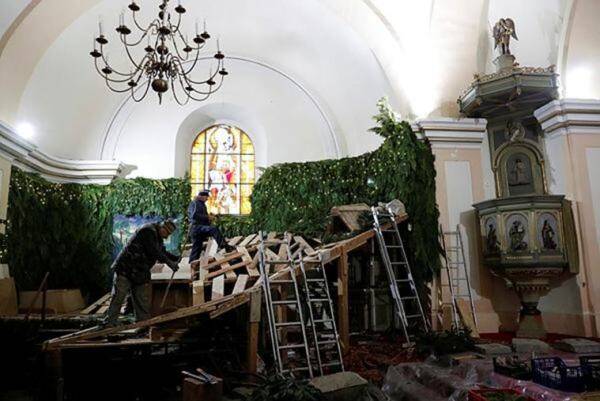Written by Patricia Cohen and Melissa Eddy
“You could feel Christmas was coming,” Amanda Whiteside, a manager at Gordon’s Wine Bar in London, said of the crowds and buzz. “And then it was gone.”
Throughout Britain and parts of Europe, new government restrictions combined with heightened anxiety over the highly contagious omicron variant have drastically reduced business at restaurants, pubs, event venues and retail stores, prompting urgent calls for additional government assistance.
https://images.indianexpress.com/2020/08/1×1.png
In Britain, the government responded Tuesday, announcing 1 billion pounds ($1.3 billion) in aid for the hospitality industry, with one-time grants of 6,000 pounds and rebates for employees’ sick leave.
Top News Right Now
Click here for more
The promise of additional assistance comes as a fresh wave of anxiety over the economy washes over the region. In France, government ministers on Tuesday announced up to 12 million euros in additional aid for travel agencies, events, caterers and indoor leisure companies that incur big operating losses this month.
In Spain, the government has scheduled an emergency meeting with regional leaders Wednesday to discuss whether to adopt new restrictions. Italy’s government is meeting Thursday.
“We are in a different phase now where lockdown will be potentially more costly,” said Claus Vistesen, chief eurozone economist at Pantheon Macroeconomics. “Up until now, we’ve been used to lockdowns followed by support from the government. I think that will be the case as well, but support will be more conditional, less comprehensive than before.”
Britain recorded the highest number of Covid-19 cases in Europe over the past seven days, according to the World Health Organisation.
On Monday, organisations representing more than 100,000 businesses around the country sent an open letter to Prime Minister Boris Johnson, demanding more tax relief and grants to tide them over.
Such concerns were echoed elsewhere. In Germany, businesses are pressing the government to lift new requirements that customers must show proof of vaccination or recent recovery. And in the Netherlands, where the government announced a lockdown over the weekend, calls to the nation’s business registry asking for help climbed past 400 Monday — seven times the number logged the previous Monday.
Although the surge of coronavirus cases brought on by the fast-moving omicron variant has not yet resulted in the kind of strict lockdown imposed by the Dutch government, British businesses argue that the combination of mask mandates, vaccination requirements and uncertainty during the peak holiday season imperiled their survival.
The retail, hospitality and leisure sectors “are teetering on the brink,” said Matthew Sims, who helped orchestrate the campaign and leads a business improvement group in Croydon, south of London.
Restaurants, pubs and bars have said that since the government added a new series of restrictions, known as Plan B, on Dec 8 as a response to omicron, cancellations have been rolling in, and foot traffic has disappeared in some areas.
In central London, it was common to find every table in Gordon’s Wine Bar’s cavelike cellar and on its outdoor patio full and a long line of customers waiting. Then Plan B was put in place.
The drop-off, said Whiteside, “was very dramatic.”
Customers thinned out, and several staff members got Covid, she said. Gordon’s is now offering only outside service, and Whiteside estimates that sales are down about 25%.
A half-mile away, in Soho, the Coach and Horses pub was similarly contending with fewer customers and sick staff. Last week, business was off by one-third; on Monday, it fell “off the edge of a cliff,” said Alison Ross, the manager.
Three of the four full-time staff members and two of the four part-timers had contracted Covid.
The hospitality industry, which lost out on the holiday bump in sales last year, was counting on a busy season this year.

 People travel on a London underground tube train on the Jubilee Line, in London, where face coverings are required to be worn over people’s mouths and noses. (AP/File)
People travel on a London underground tube train on the Jubilee Line, in London, where face coverings are required to be worn over people’s mouths and noses. (AP/File)
Simon Emeny, CEO of Fuller, Smith & Turner, which owns roughly 400 pubs, including the Coach and Horses, said in a statement, “We are right back to where we were in March 2020 with the government keeping hospitality open, while effectively telling the public not to socialise.”
The company has temporarily closed 20 pubs, a spokesperson said.
About 200,000 hospitality and leisure businesses will be eligible for the new grants. The government will also cover the cost of legally required sick pay for small and midsize businesses and is replenishing a culture fund for organisations including theaters, orchestras and museums, with another 30 million pounds.
From sectors not included in the package, there were complaints.
“Travel agents, tour operators and travel management companies will rightly be asking why they haven’t been given the same treatment as other businesses that are suffering at this time,” said ABTA, a trade association of travel agencies and tour operators.

 Locals prepare one of Europe’s largest indoor nativity scenes at the St Martin Church in Vors, Hungary. (Reuters)
Locals prepare one of Europe’s largest indoor nativity scenes at the St Martin Church in Vors, Hungary. (Reuters)
In the Netherlands, where most shops, bars, restaurants, gyms, outdoor sports, cultural venues and schools are closed through January, some business owners fear they may never reopen.
“That is something that I ask myself every day,” said Omar Waseq, who owns a cheese bar and film cafe in the center of Utrecht, Netherlands. “I’m not 100% sure.”
Waseq estimated that he is losing about $50,000 each month while his cheese bar, Kaasbar Utrecht, is shuttered, and $100,000 at the cafe. Plans to rebuild a nightclub he owns that was burned in a fire in January have been postponed. He has had to let go most of his 80-person staff and is trying to make money selling mulled wine in the streets and cheese packages door to door.
Waseq said that because he opened his business after the pandemic began and did not have 2019 sales to use as a benchmark comparison, he was not eligible for government assistance.
Ron Sinnige, a spokesperson for the national business registry, the Kamer van Koophandel, said the agency was flooded with calls this week asking about financial assistance, advice or liquidating their operations. Some were seeking guidance on how to qualify as an essential business: Could a clothing store sell candy and soda? Could a beauty salon offer post-surgical massages or list Botox injections as a medical procedure?
The questions were a sign of people’s creativity and despair, Sinnige said. “As opposed to previous lockdowns, people are really at the end of their financial flexibility and emotional flexibility,” he said.

 People protest against Covid-19 measures as police forces stand guard, near the European Commission in Brussels, Belgium Nov 21, 2021. (Reuters)
People protest against Covid-19 measures as police forces stand guard, near the European Commission in Brussels, Belgium Nov 21, 2021. (Reuters)
France has canceled a menu of year-end celebrations and banned tourists from Britain, a blow to the ski industry.
On Tuesday, the Swedish government imposed some new restrictions that included allowing only seated customers to be served in restaurants and bars.
Ireland imposed an early curfew of 8 p.m. on restaurants and bars that began Monday, while limiting attendance at events.
In Denmark, restaurants and bars must cut off serving alcohol after 10 p.m., and a slate of venues and event spaces including theaters, museums, zoos, concert halls and Tivoli, Copenhagen’s landmark amusement park, have been closed.
Switzerland’s restrictions that bar unvaccinated people from going to restaurants, gyms and museums are expected to last until Jan. 24.
In Germany, the check-in process at stores, which requires stopping everyone at the door and asking to see their vaccination certification and an ID, was deterring shoppers at what would normally be the busiest time of the year, the German Trade Association said.
Retailers surveyed by the group reported a 37% drop in sales from Christmas 2019.
“After months of lockdowns, the restrictions are once again bringing many retailers to the edge of their existence,” said Stefan Genth, head of the Trade Association.
A court in the northern state of Lower Saxony last week threw out the restrictions there, after the Woolworth department store chain challenged them on the grounds they were not fairly applied and requiring shoppers to wear masks provided sufficient protection. The ruling Thursday raised hopes that other states would follow its lead, giving a final boost to last-minute shoppers.
“Last weekend was better, but overall the shopping season has been more than depressing,” said Mark Alexander Krack, head of the Lower Saxony Trade Association.

